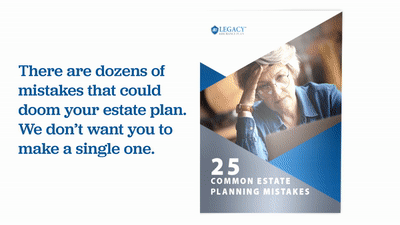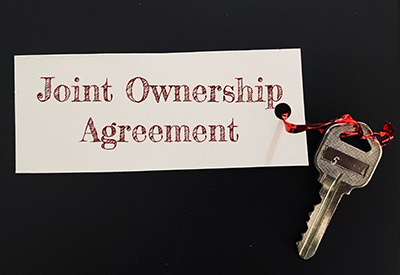The fear of probate motivates many families to tend to estate planning obligations, especially when they hear real-life horror stories about difficult court proceedings, steep legal fees and potential inheritances consumed because of long delays and administrative costs. It's no wonder that probate avoidance has become a primary goal for many people engaged in estate planning. Yet in their rush to circumvent the probate process, well-meaning individuals often make critical mistakes that can lead to family disharmony, legal hassles and financial consequences far worse than the probate proceedings they sought to avoid.
The irony is that while probate can indeed be cumbersome, many of the most damaging probate avoidance mistakes are entirely preventable.
What are common mistakes in trying to avoid probate?
Three of the most common mistakes people make while trying to avoid probate involve failing to update their legal documents, the use of joint ownership arrangements and not naming contingent beneficiaries. While the desire to avoid probate is understandable, many individuals make critical errors in their attempts to do so.
Failing to review and update your estate plan

One of the most serious mistakes in probate avoidance planning is creating a plan and then failing to maintain it. Life changes constantly, and your estate plan needs to keep pace with these changes.
Your estate plan needs to be updated due to major life events involving you, your family and your beneficiaries that can significantly impact your probate avoidance strategy. Those events include:
- Marriage or divorce.
- Birth or adoption of children.
- Death of beneficiaries.
- Acquisition or sale of major assets.
- Moving to a different state.
- Changes in tax laws.
- Changes in relationships with beneficiaries.
- Significant changes in asset values.
Many people don't realize or forget that beneficiary designations on life insurance policies, retirement accounts and transfer-on-death accounts supersede the wishes and instructions stated in their last will and testament. Failing to update these designations after life changes - despite updates or revisions to their will - can result in assets going to unintended recipients and still triggering probate.
Life's unpredictable nature often requires us to reassess and revise our estate plans, particularly when our beneficiaries experience significant life changes. While you might have carefully crafted your initial estate plan under one set of circumstances, the situation of your intended heirs can shift dramatically over time, requiring thoughtful adjustments to your planning strategy.
For instance, if a beneficiary develops special needs, your original plan could actually harm them by disqualifying them from essential government benefits. In such cases, you might need to establish a special needs trust rather than leaving assets directly to them. Similarly, when a beneficiary struggles with addiction, leaving them an outright inheritance could fuel their dependency. A carefully structured trust with distribution provisions tied to recovery milestones might better serve their long-term interests.
Marital instability among beneficiaries presents another compelling reason to update your plan. If your heir's marriage shows signs of trouble, you might want to protect their inheritance from divorce proceedings by using trust structures that keep the assets separate from marital property. Even changes in your beneficiaries' financial management skills deserve attention. Someone who once demonstrated sound financial judgment might later show signs of poor money management, suggesting the need for more controlled distribution methods.
These evolving circumstances remind us that estate planning requires ongoing attention and periodic updates to ensure our wishes align with our beneficiaries' current realities. What worked perfectly when you first created your plan might need significant revision to protect both your legacy and your loved ones' best interests.
Using joint ownership arrangements

One of the most critical mistakes in probate avoidance planning involves the use of joint ownership arrangements. While adding someone's name to your assets might seem like a straightforward way to transfer an asset outside of probate, this approach often creates more problems than it solves.
Joint ownership arrangements carry significant immediate risks that many people fail to consider. When you add someone as a joint owner, your assets become vulnerable to their creditors - meaning your home or bank account could be at risk if your joint owner faces a lawsuit or declares bankruptcy. You also surrender full control over your assets; any major decisions, such as selling or refinancing property, now require your joint owner's consent.
Take the case of Mrs. Wilson, a widowed mother of three who was determined to spare her children the burden of probate. After reading advice online, she added her eldest daughter as a joint owner on her bank accounts and house deed. What seemed like a simple solution created a cascade of unintended consequences ranging from exposure to her daughter's bad debts and other liabilities to a bitter family dispute that tore her children apart after her passing.
From a tax perspective, joint ownership can be costly - your heirs might lose the valuable step-up in basis they would have received had they inherited the property instead. These arrangements can also interfere with other estate planning goals, such as asset protection or tax minimization strategies and could seriously complicate your Medicaid eligibility if you need long-term care. In blended families, joint ownership can create particular complications, potentially disinheriting children from previous marriages.
Neglecting to name contingent beneficiaries
A third critical mistake in probate avoidance planning is one that many people overlook entirely: failing to name contingent beneficiaries. While most people understand the importance of naming primary beneficiaries, they often neglect to plan for scenarios where these primary beneficiaries cannot or do not inherit. This oversight can have serious consequences for your estate plan.
The situations that prevent primary beneficiaries from inheriting are more common than many people realize. The most obvious scenario is when a primary beneficiary passes away before the person leaving the inheritance. In these cases, without proper planning, the assets might end up in probate or be distributed in ways that weren't intended. While some estate plans specify that the deceased beneficiary's share should pass to their children (known as a per stirpes distribution), others might redirect the assets to surviving beneficiaries (per capita distribution). Without clear instructions, state laws typically determine how these assets are distributed.
Incapacity or disability can also prevent primary beneficiaries from inheriting directly. If a beneficiary lacks the legal capacity to accept an inheritance or has special needs, direct inheritance might be inappropriate or even harmful. For instance, an inheritance could disqualify someone from crucial government benefits they rely on for medical care or basic needs. In these cases, a guardianship or conservatorship might be necessary, or the estate plan might need special provisions to protect the beneficiary's interests.
To avoid these issues, estate planning professionals recommend implementing several best practices for contingent beneficiary planning. First, establish multiple levels of contingency in your plan. Start with your primary beneficiaries, then name secondary beneficiaries who would inherit if the primary beneficiaries cannot. Add tertiary beneficiaries as another layer of protection, and include final distribution provisions that specify where assets should go if no named beneficiaries survive - perhaps to a favorite charity or educational institution.
How to avoid probate?

A revocable living trust can provide an effective estate planning solution for probate avoidance. Unlike joint ownership, a living trust allows you to maintain complete control over your assets during your lifetime while still ensuring they pass smoothly to your beneficiaries at death. Trusts offer significant privacy advantages and can be modified as your circumstances change. They also allow you to provide detailed instructions for asset distribution and include provisions that protect your beneficiaries' interests, such as spendthrift clauses or special needs considerations.
Beyond living trusts, several other tools can help achieve probate avoidance goals more effectively than joint ownership. Transfer-on-death deeds offer a way to pass real estate directly to beneficiaries without the risks of joint ownership. Similarly, payable-on-death designations on bank accounts can achieve probate avoidance without surrendering current control. For specific situations, specialized tools like life insurance trusts can provide both probate avoidance and tax benefits. Business owners might find that limited liability companies offer better solutions for transferring business interests while maintaining control and providing liability protection.
It's also important to regularly review and update your beneficiary designations. Verify the status of all named beneficiaries and contingent beneficiaries and ensure that they work in harmony with your other estate planning documents, creating a coherent overall strategy.
The key is understanding that probate avoidance shouldn't come at the cost of creating other legal, financial or family complications. Working with qualified estate planning professionals can help you select the tools that best fit your specific situation while avoiding the pitfalls of overly simplified solutions like joint ownership.



